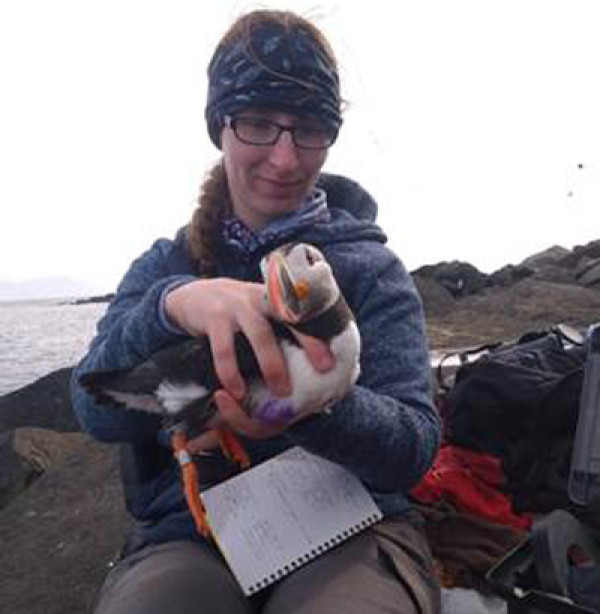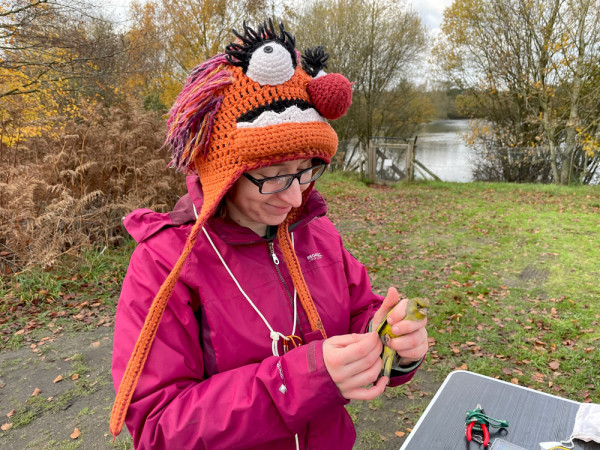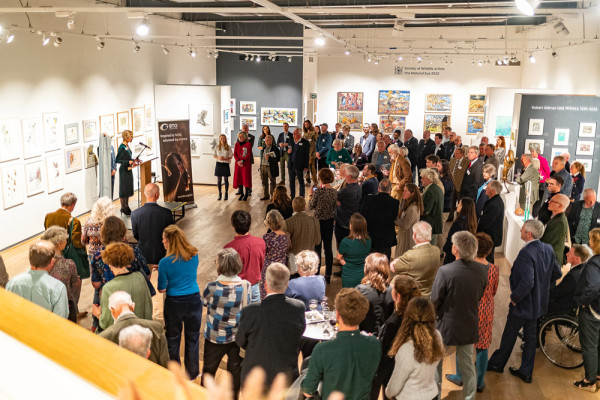
Finding my place(ment): taking a break from a PhD
PhD student Fionnuala McCully completed a three-month placement with the BTO Comms Team in December last year. She reflects on her time with the organisation and the benefits she experienced while stepping back from her studies.
While writing this blog post, I have been wracking my brains, trying to decide if it is ever a bad idea to try something new. I don’t think it is: If you love ‘the new thing’, the doors which may open to you could be life-changing, and even if you hate it, well, sometimes being able to definitively classify something as ‘not-for-me’ can be a blessing.
When you are in the middle of a PhD, it can be easy to forget that ‘other things’ (in terms of both career and downtime) exist. The road is long, and because PhD research requires you to be a jack-of-all-trades (writing, coding, presenting, fieldwork – you have to do it all!), you may find yourself forgetting which activities you actually enjoy the most. Taking a break can help you remember.
After nearly three years of working on my project on parental care in seabirds, I needed a change of scenery.
Taking a step back: planning a placement
After nearly three years of working on my project on parental care in seabirds at the University of Liverpool, I needed a change of scenery.
My doctoral training partnership, ACCE, provides their PhD candidates with an opportunity to apply for three months extra funding to do something different: a placement working on something outside the confines of their PhD. This is an invaluable opportunity for early career researchers to get experience in the workplace, gain new skills and discover – or perhaps rule out! – a potential career path.


From the very beginning of my time at Liverpool, I wanted to complete one of these placements. By 2022, the major constraints imposed by COVID-19 had been dissolved (so no placement-ing from home, which was not appealing to me), and I had (temporarily) had enough of quantitative data analysis. I wanted to have a go at a form of work which came more naturally to me.
Having previously been a higher education lecturer, I have always had an interest in science communication – but I didn’t want to revisit old ground via teaching. I also didn’t want to stray too far away from birds. I like birds… and I can’t really see a future where my work doesn’t involve them in some capacity.
So where could I go to complete my placement?
BTO was an obvious choice, and I was thrilled when they agreed to host. Specifically, I reached out to their Communications Team. I hoped that this department would be able to get me involved in my target activities, like writing for different audiences and gaining media experience. BTO’s dedication to science would also prevent me from straying too far from the research skills which I have spent the last 12 years developing.
Of course, I would work for my keep: in exchange for all these valuable opportunities, I would complete a project for BTO, evaluating their science communication strategies. Are BTO messages getting through to their target audiences? Between September and December 2022, it was my job to find out.

Joining the BTO Comms Team in Thetford
So, having departed Liverpool for a residency in Thetford, my placement began.
The Comms Team put me to work writing for BTO’s various publishing media, helping out with events such as BBC Autumnwatch and the BTO Youth in Nature Summit, and contributing to BTO’s social media. I was even given a small spot on BBC Radio Suffolk, during which I geeked out about seabirds.

Almost immediately, I enjoyed working for BTO. I felt right at home in a world of varying topics, fast deadlines and cooperative projects. These were working conditions I had experienced in previous employment, and which I’d missed during the singularly focussed, long-term and occasionally solitary project which is my PhD.
What is more, the organisation itself is full of the friendliest, most welcoming people you are ever likely to meet. Even before my placement had started, Head of Communications Mike Toms and Science Communications Manager Viola Ross-Smith provided me with heaps of support as I developed my placement proposal. Once I got there, they (as well as employees from every other team you can think of) did all they could to make sure I felt welcomed and valued. Plus, they all know a lot about birds and I love learning new things about birds!
In between the day-to-day jobs of the department, I chipped away at my placement project, interviewing representatives of BTO’s target audiences: wind farm developers, government agency workers, BTO Regional and Youth Representatives, museum curators, landowners, academics… Speaking with such a wide range of people was one of the best parts of my placement. I learned huge amounts about lots of different industries, engaged in some valuable networking, and also got an insight into the range of jobs available out there in the world. All of this might come in handy when I finish my PhD…
Speaking with such a wide range of people was one of the best parts of my placement – I learned huge amounts about lots of different industries.

Developing an action plan for BTO’s science communications
After I had asked my questions and collated the interviewees’ answers, it was time to translate all those conversations into something tangible that BTO can use to improve their communication strategy. As a behavioural ecologist, I will grudgingly admit that producing outputs with high applied value is not something I get to do very often. It was therefore refreshing for me to produce an action plan based on my findings, which could be put into practice immediately.
It was also a pleasure to reassure my new BTO colleagues that all the wonderful work they do is appreciated by their audience. All my interviewees had many positive things to say about BTO and the work they produce. In particular, it was clear that BTO’s evidence-based approach and the expertise of BTO staff were key selling points. There is work to do, particularly concerning the refinement of messaging and reaching key audience members, but I hope that my action plan leaves BTO in a strong position to move forward.
My placement with BTO helped me see what might lie beyond my studies. Life will continue, and when I finish, I am confident that I will be considered skilled and employable.
Taking my placement experience forwards into my PhD
In what felt like a blink of an eye, my placement was over and it was time to go back to Liverpool. My PhD was waiting for me, and it wasn’t going to finish itself – but I returned refreshed and ready to take on the new challenges it might send my way. On top of this, I could rest easy in the knowledge that I had benefited hugely from ‘trying something new’.
Opportunities at BTO
Visit our Vacancies page to explore opportunities to work, volunteer or study with us.
You can also contact people [at] bto.org for more information and advice.
I am looking forward to the rest of my PhD, but my placement with BTO helped me see what might lie beyond my studies. Life will continue, and when I finish, I am confident that I will be considered skilled and employable.
If you are a student, and you think you might benefit from a break or a placement, I strongly encourage you to examine your options. If your programme offers a placement scheme, investigate it. If not, make a plan and discuss it with your supervisor and your funding body. Alternatively, reach out to other PhD students who have done something similar – the vast majority of them will be happy to advise.
I also thoroughly recommend BTO as a placement provider! The experience was second to none. When I left BTO, I was leaving with a portfolio of articles, considerable work experience and many, many new friends. Crucially, my placement reaffirmed my belief that trying something new is rarely a bad idea. In fact, it might be exactly what you need to carry you through this life stage and into the next.
Acknowledgements
A big thank you to the ACCE Doctoral training partnership for providing additional funding so that I could undertake this placement. Thanks also go to Dr Samantha Patrick for her support.
I massively appreciate the support of everyone at the BTO and thank them for being so welcoming. In particular, I thank everyone in the Science Communication Team, especially Mike Toms and Viola Ross-Smith, for all their hard work before, during and after my placement.








Share this page